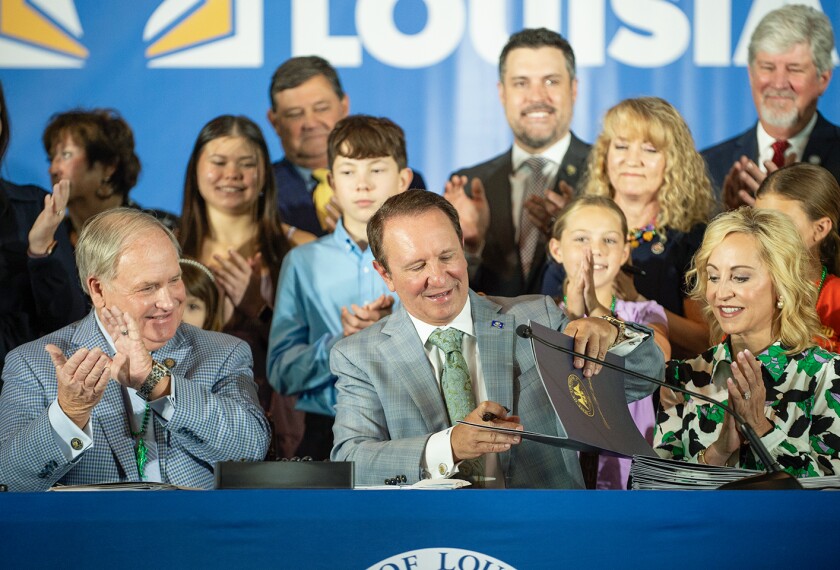The U.S. Supreme Court term that ended late last month was not nearly as significant for education law as the court’s previous term. But it was one of momentous change in terms of personnel, with Justice Sonia Sotomayor serving her first year and generally ruling with the court’s liberals, and the retirement after nearly 35 years of Justice John Paul Stevens, a champion of strict church-state separation and often of the rights of students. Here are capsule summaries of several cases school law experts were watching:
FIRST AMENDMENT
Nondiscrimination Policies in Schools
Christian Legal Society Chapter v. Martinez (08-1371)
The justices ruled that a law school may deny recognition to a Christian student group that refuses membership to gays and lesbians. The school’s “accept-all-comers” policy, Justice Ruth Bader Ginsburg wrote in a 5-4 opinion for the court, is a reasonable, viewpoint-neutral condition on access to the privileges of registered student groups, and thus does not violate the First Amendment rights of the religious group.
The National School Boards Association, which had filed a friend-of-the-court brief with the National Association of Secondary School Principals on the law school’s side, said the decision would help K-12 schools apply their nondiscrimination policies to student clubs.
Political Speech
Citizens United v. Federal Election Commission (08-205)
In a 5-4 ruling that defined the court’s term, the justices overturned limits on campaign spending for political-advocacy ads by corporations and labor unions. The court overruled two precedents on campaign finance and struck down, under the First Amendment’s free-speech clause, key provisions of the Bipartisan Campaign Reform Act of 2002, better known as the McCain-Feingold law.
Although the AFL-CIO, of which the American Federation of Teachers is a member, had filed a brief opposing limits on union political speech, both the aft and the National Education Association criticized the court’s decision, saying it would prove far more beneficial to corporate interests in federal elections than to unions.
FOURTH AMENDMENT
Public Employees’ Work Privacy
City of Ontario, California v. Quon (08-1332)
The court unanimously upheld a California city’s search of a police officer’s government-provided pager that revealed sexually explicit text messages. But it stopped short of issuing a broad ruling about the rights of public employees to be free of intrusive government searches of their communications devices and records.
The NSBA and the NASSP had urged the high court to rule broadly that public employees do not have reasonable expectations of privacy in their electronic communications on government technology. But Justice Anthony M. Kennedy said that the high court must “proceed with care” when considering the privacy expectations of workers.
EIGHTH AMENDMENT
Juvenile Justice
Graham v. Florida (08-7412)
The court ruled that a sentence of life in prison without the possibility parole for a juvenile offender in a nonhomicide case violates the Eighth Amendment’s prohibition against cruel and unusual punishment. The justices decided 6-3 to overturn the sentence of a Florida man who received such a sentence for a series of robberies he had committed at ages 16 and 17, although only five justices backed the broader Eighth Amendment ruling.
Justice Kennedy wrote for the majority that, in accord with a 2005 Supreme Court decision that barred the death penalty for juvenile offenders, developments in psychology and brain science continue to show that juveniles are more capable of change than are adults, and that their actions are less likely to be evidence of “irretrievably depraved character than are the actions of adults.”
CIVIL RIGHTS
Attorneys’ Fees
Perdue v. Kenny A. (08-970)
The justices ruled unanimously that federal courts may award enhanced attorneys’ fees, above and beyond normal hourly rates, to lawyers who do an exceptional job in seeking institutional reform in such areas as foster care and education. But such enhanced awards will be upheld only in extraordinary circumstances, Justice Samuel A. Alito Jr. wrote for the court. The justices ruled 5-4 that an enhancement of $4.5 million, on top of $6 million in regular hourly fees, to lawyers who brought about changes in Georgia’s foster-care system was not justified.
The case was monitored by the NSBA, which filed a friend-of-the-court brief on the side of Georgia arguing that enhanced-fee awards would harm districts and discourage them from settling lawsuits seeking broad reforms.





